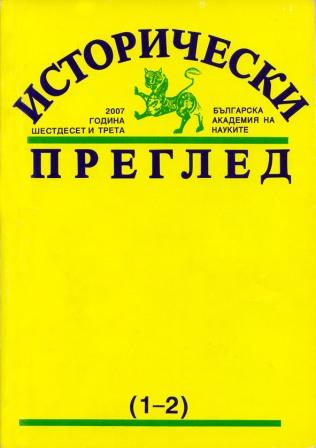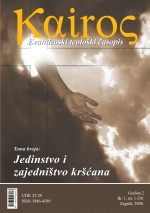


The documents from the Archives of the Bulgarian Ministries of Foreign Affairs and Trade of the ruling communist party provide a rich base for a detailed study of the foreign-economical activities of Bulgaria with the Near East during the Cold war period and in particular with one of the main partners of the Eastern block in that region - Egypt. The article attempts to clarify the strategic aims of the Bulgarian economic policy in respect of Egypt. In the context of the leading tendencies of bilateral nature, the study marks the fundamental problems of the Bulgarian energetic needs in the examined period, the efforts on Bulgarian part to offer as a main export commodity the products of its civil machine-building as well as the building of Bulgarian kind of light industry factories, aiming a longer-term target - favorable development in the modernization of the Bulgarian economics which was organized and technologically shaped as a soviet project. The article traces the process of strengthening of the positions of the products of the military-industrial complex as a main feature of the Bulgarian export for Egypt, which despite all expectations didn.t guarantee the Bulgarian economic interests.
More...
In the middle of the 80-ies of the last century, the crisis in the states from the socialist camp in Eastern Europe, including the Soviet Union, became ever more deeper and obvious and in fact irreversible. The attempts of the ruling circles to overcome, or at least to diminish the most negative consequences of this crisis were unsuccessful. The communists in the system saw the increasing need for radical changes in the system, while their opponents saw - what in the long run became reality - the need for changing the system itself. Bulgaria is one of the states in Eastern Europe where the changes began later. The Bulgarian authors as a whole accept the events from the end of 1989 as a start of the so-called transition in Bulgaria. The present article traces the events and particular facts that followed the fall from power of Todor Zhivkov in 10 November 1989. The essential contribution of the article is that this is made through the prism of all research materials of Bulgarian authors who wrote on that theme. In this way it forms a full historiography picture of the researches on that topic.
More...
Sources and Documents / The starting point of the author’s study are not the characteristics of the Besarabian Bulgarians as a whole - their way of life, the history of their migration, their folklore heritage, the imposed influences from the adoptive states, the modernization of their cultural traditions nowadays, the political factors sustaining (or crushing) their national self-consciousness in this specific Bulgarian community, placed outside the limits of the motherstate. The interest of the author in that ethnographic group has a different origin and starts from the point of view of the magazine “Nation and politics”, published mainly during the thirties of XX century in Sofia. As an independent periodical on public and political issues, edited by young intellectuals on an absolutely voluntary and noncommercial principles, that newspaper became an interesting focus, through which one could catch the spirit of the epoch and to register the main tendencies in the development of the Bulgarian social opinion at that time, including on the questions of the Bulgarians, who lived outside the limits of Bulgaria.
More...
Keywords: European Parliament; Tatyana Zhdanok; Wall Street Journal; Latvian politics; human rights; ITAR-TASS; Latvia’s First Party; Latvian parliament
Schoolchildren protesting Latvia’s educational reform greet European parliamentary deputies in Strasbourg--with some inside help.
More...
Keywords: Paddy Ashdown; Dayton peace agreement; Zoran Djeric; Dragan Kalinic; Serb Democratic Party; Partnership for Peace; OHR; Human Rights
The Council of Europe’s Venice commission is to examine the use of the high representative’s powers in Bosnia.
More...
Keywords: Islamic and Christian worlds; Bridge in Mostar; Serb nationalists; Bosnian Muslims; Paddy Ashdown; UNESCO; Croatia; Bosnia; Serbia; Montenegro
It may not bridge all the differences between Bosnian Muslims and Croats, but the attention paid to Mostar’s Old Bridge may reawaken them to the truth that it doesn’t hurt to be civilized with one another.
More...
Keywords: Sunday Times; psychological disorders; intellectual disabilities; Zdenek Skromach; Vaclav Klaus; Czech government; violation; human rights; caged beds; J. K. Rowling
J. K. Rowling’s protest helped take handicapped Czech children out of “cages.” But will it help find them homes?
More...
Keywords: Russian troops; Ingushetia; Dagestan; military reforms; Chechnya; Soviet Union; Vladimir Putin; Vyacheslav Tikhomirov; Mikhail Labunets; Anatoly Yezhov; Federal Security Service; Vladimir Boldyrev; Moscow News; National Strategy Institute; separatism
Putin axes Russia’s senior commander and its top military leaders in the North Caucasus.
More...
Keywords: Protesters; Kosovo Albanian refugees; airport; runway; mass protests; Kalashnikov; machine gun; automatic rifle; NATO bombing; squatters; central control; corruption
Some locals warn that ongoing conflict over land on which an Arab-funded airport is to be built could end in tribal war in Albania’s impoverished north.
More...
Keywords: Fiona Hill; Clifford Gaddy; Brookings Institution Press; How Communist Planners Left Russia Out in the Cold; Russia; Novosibirsk; market economy; Soviet era
Instead of relocating Siberia's elderly to warmer climes, say the authors of 'The Siberian Curse,' Russia should subsidize them until they die off.
More...
Keywords: Alyaksandr Lukashenka; Belarusian president; independent mass media; Zubr; protest; AMAP troops; parliamentary elections; RTR; demonstrations; NATO
Lukashenka marks his 10th anniversary in power in typical style: listing his virtues, cracking down on the opposition, and throwing out a Russian TV channel.
More...
Keywords: ICTY; Serbian Democratic Party; Dragan Cavic; Party of Democratic Progress; Dragan Mikerevic; SFOR; War and Peace Reporting; Paddy Ashdown; NATO; Dragan Kalinic; war criminals; Social Democratic Party of Bosnia and Herzegovina; EU
Republika Srpksa passes a resolution warning indicted war criminals to turn themselves in or face arrest. It sounds all too familiar, and weak-willed, to many people.
More...
Keywords: Polish Television; public media; Maciej Grzywaczewski; Gazeta Wyborcza; Program 1; Civic Platform party; parliamentary elections; Robert Kwiatkowski; Rzeczpospolita; Newsweek; Puls TV; Democratic Left Alliance; Trybuna
People on the right have pluralism encoded in them, claims the head of Poland's flagship public-service television channel.
More...
Keywords: Romani minority; nomadic lifestyle; Roma groups; Communists; Polish Roma; European Roma Rights Center; ghetto
The on-again, off-again relations between the majority and the Roma in one Polish town mirror the situation across Central Europe.
More...
Keywords: Donetsk region; methane gas explosion; Viktor Yanukovych; Krasnolymanska; Leonid Kuchma; Coal of Ukraine; Vuhillya Ukrainy
The worst accident since 2002 claims the lives of 36 in Ukraine’s mining heartland.
More...
Keywords: Stabilization and Association Agreement; European Integration; European Union; Adnan Terzic; Paddy Ashdown; Frane Maroevic; Serb Democratic Party; Radovan Karadzic; Ratko Mladic; Republika Srpska; war criminal; NATO
Bosnia’s politicians are too slow in adopting reforms to enable the country to sign a Stabilization and Association Agreement with the EU.
More...
Keywords: violence; Georgia; South Ossetian troops; Mikheil Saakashvili; Abkhazia; Vladimir Putin; Interfax; Eduard Kokoiti; Gazprom; OSCE
Georgia’s president threatens to tear up the 1992 ceasefire agreement with South Ossetia.
More...
Unity is not just an unfulfilled idea of the Christian world. It is the axiom of reliability and sustainability of the Church founded in the Bible. Throughout history the Church has demonstrated that without unity it ceases to be “salt and light.” Unity cannot be imposed as an ideology, but can only be built through fellowship. This is the witness of the churches of the Reformation tradition in Croatia which have proved in the last twenty years that many great things occur when God’s children come together.
More...
The article is an exposition of John 17 which provides the most detailed expression of Jesus’ desire for his followers. As he faces the hour of the redemptive event, Jesus prays for not only for himself and his closest disciples, but for all who will become believers through the message of the Apostles. The exposition identifies the subjects of Christ’s prayer, the requests themselves, and the purpose of the requests. The purpose is identified as “that the world may know that the Son is sent from the Father and that the Father loves the disciples as he loves the Son.” Implications are drawn from the prayer for believers living in a post-modern culture.
More...